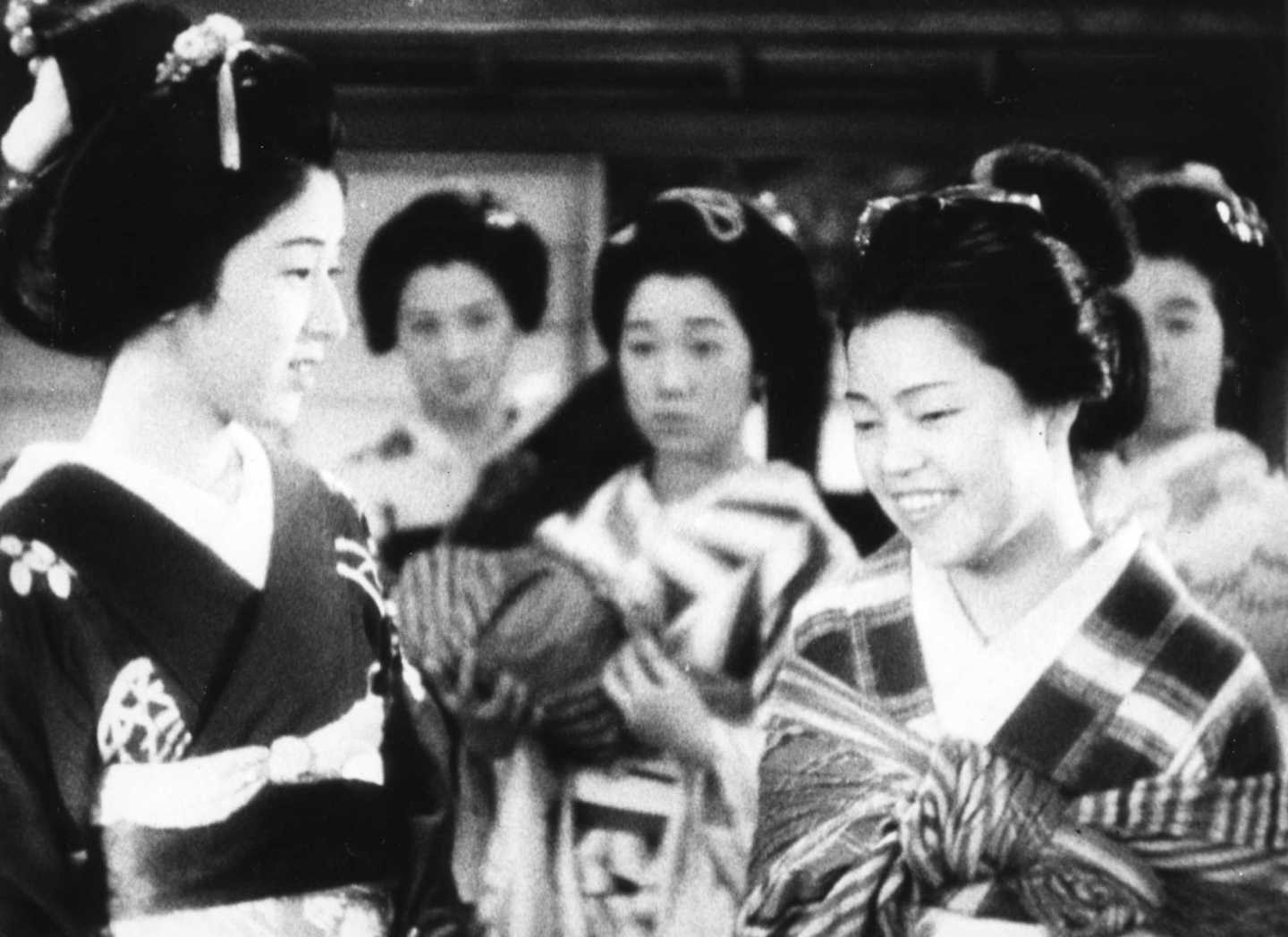
By the late 1930s, film censorship had tightened and it was perhaps all but impossible to rebuke the militarist regime through the silver screen. Nevertheless, as always setting your film in the past can make the impossible possible through thinly veiled allegory. This may not have been its primary intention, but it’s impossible to ignore the subtext of Tamizo Ishida’s Fallen Blossoms (花ちりぬ, Hana Chirinu) which sets itself entirely within the confines of a geisha house on the night of the Kinmon incident or Hamaguri Gate Rebellion in 1864 during which anti-Shogunate forces from Choshu marched on Kyoto with the intention of kidnapping the emperor in order to restore imperial rule. The incident ended in devastating defeat for Choshu with rebel forces setting fire to the city as they bid their retreat.
There is therefore an uncomfortable anxiety in the context of the Japan of 1938 as the women trapped inside the teahouse remark on the chaos outside with unfamiliar soldiers on the streets and townspeople deciding to remain at home which is of course very bad for their business. Aside from the sense of danger, the major problems inside the house are economic with constant talk of declining revenues and the recent closure of similar establishments while even the guests that have come have done so to drown their sorrows as their own business is also going badly because of the rumours of imminent unrest. The situation is all the more acute for Akira (Ranko Hanai), daughter of the house’s madam, because she’s secretly fallen in love with a young man of Choshu she fears may be marching on the city which is one reason she deflects her mother’s attempts to encourage her to accept an offer of marriage from a wealthy associate.
As Akira later puts it, her mother was born in the teahouse, became a geisha and then its madam. She sees herself sharing the same fate but wants to experience a different kind of life, curious about what lies outside the pleasure district. Maid Miyako (Kimiko Hayashi) was sold to the geisha house as a child because her family was poor, she doesn’t think the life outside is anything worth seeing. Yet she too wonders what her fate might be, believing herself to be too plain to make it as a geisha and particularly to attract the kind of wealthy patron who could provide an escape route. Matsuba (Ayako Ichinose), a former geisha, did just that but now she’s come back apparently regretting her decision because she’s neither wife not maid in her new home but also occupies a liminal status in the teahouse, her actions deliberate or otherwise reinforcing the idea that she is no longer a geisha in her inability to tie Akira’s obi and claims to have forgotten the words when asked to rehearse a piece of music with another of the women. “Surely it’s OK for a girl to dream, even in the Kuruwa” Akira fires back but perhaps on some level knowing that her mother has a point when she says that samurai don’t marry young women of the pleasure district.
Even so Akira’s romantic fantasy takes on even greater import when a man begins loudly banging on their door and demanding to be let in, presumably in fear for his life. Akira rushes forward to open it, but is held back by her mother and the other women. After a while the sound of fighting stops and it’s assumed the man has been killed. Akira doesn’t know if the man was her lover or not, but it makes no difference. Someone called for her help and she refused it. Guilt and shame overwhelm her. Her mother’s decision may prove to be a prudent one, though she is in any case later arrested by the pro-shogunate Shinsengumi police presumably suspicious the geisha house may have harboured rebel soldiers. Akira’s double sense of guilt that what’s happened to her mother is partly her own fault prevents her from leaving with the others when it becomes certain that their only choice is to evacuate the city. Her only point of refuge is on the watchtower, apparently unique to her geisha house and said to be haunted by someone murdered by the Shinsengumi, where she sees the smoke of fires glowing on the horizon. Her lover’s poem falls from her hand as if in admission that her dream is ended and there will be no escape for her from the environs of the Kuruwa.
The moment is therefore one of eclipse and endings, a city a falling but not as the invaders are beaten back and defeated. Prophetic and chilling in its import as bells strike ominously in the background while the city burns, the film paints a bleak prognosis for a Japan of mounting imperialist ambitions. Drunken geisha Tanehachi (Reiko Minakami), herself trapped in the Kuruwa apparently because of a bad man she cannot escape, reveals that her father was beheaded in the street for disrespecting a samurai and if this is the beginning of their end then so be it, but even so “Kyoto is finished. No matter who loses it will make no difference.” Adapted from a stage play by Kaoru Morimoto, Ishida’s increasingly anxious drama never leaves the geisha house or repeats a shot and situates itself entirely within a world of women where men are heard but never seen, but finally leaves its heroine all alone watching helplessly as the fires creep closer.
